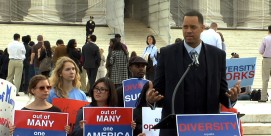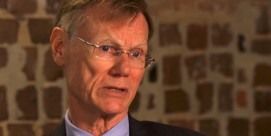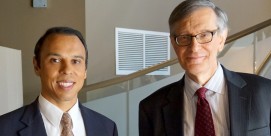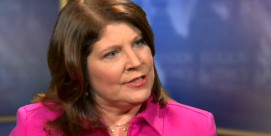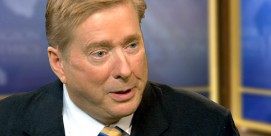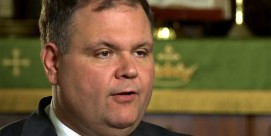JOHN AUBERGER (Town Supervisor; Greece, NY): The August 20, 2013 meeting of the Greece town board will now come to order!
TIM O'BRIEN, correspondent: Ever since John Auberger was elected town supervisor 15 years ago in Greece, New York, a predominantly Catholic suburb of Rochester, the town has begun its monthly meetings with a prayer.
TOM LYNCH: For the benefit of all Greece and mankind in general, we offer these prayers...
O'BRIEN: On this evening last August, the prayer was offered by Tom Lynch, an adherent of the Bahai faith.
LYNCH: Oh thou, oh kind Lord, this gathering is turning to thee.
O'BRIEN: It was Auberger’s idea.
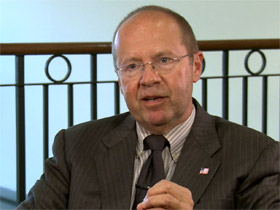
JOHN AUBERGER: It’s important from primarily a historical perspective. Our Founding Fathers believed in the right for us to pray and have that freedom of expression in prayer, and that’s what we offer here today in 2013 in the Town of Greece.
O'BRIEN: But the Founding Fathers also drafted the First Amendment, prohibiting the government from establishing religion—no state sponsored church.
Two Greece residents, Linda Stephens—an atheist—and Susan Galloway, who is Jewish, say for any governing body to begin its sessions with such prayers violates that First Amendment ban.
SUSAN GALLOWAY (Plaintiff): I think for the protection of government, as well as for the protection of religion, they need to be separate. I think when government gets involved in religion, it corrupts religion and I think when religion gets involved with government, it can corrupt government.
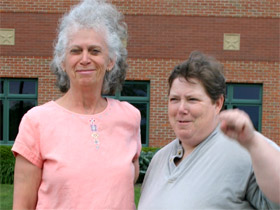
O'BRIEN: A federal appeals court in New York sided with Galloway, noting that roughly “two-thirds of the prayers offered contained references to ‘Jesus Christ,’ ‘Jesus’, 'Your Son,' or the ‘Holy Spirit.'”
Judge Guido Calabresi wrote, “We do not hold that the town may not open its pubic meetings with prayer or invocation. Americans have done just that for more than two hundred years. But when one creed dominates others—regardless of a town’s intentions—constitutional concerns come to the fore.”
This is not merely a contest between a small town and two of its residents. The town’s case has all but been taken over by—and financed by—the Alliance Defending Freedom, a national advocacy group promoting more government accommodation of religion. The plaintiffs’ case has been taken over by Americans United for Separation of Church and State, whose staff attorney, Ayesha Khan, will argue on their behalf in the Supreme Court.
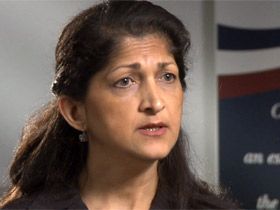
AYESHA KHAN (Attorney, Americans United for Separation of Church and State): Greece is opening its meetings with a presentation that is uniquely Christian, in an environment where people have come to petition the government. From the time the prayer practice started in 1999, up until the end of 2007—an eight year time period—they had nobody but Christian clergy.
O'BRIEN: But what about Tom Lynch of the Bahai faith, who delivered the prayer when we were there with our cameras last August?
TOM LYNCH (Prayer Giver, August 20, 2013): Well, actually, this was my second time.
O'BRIEN: When was the first time?
LYNCH: In 2008.
O'BRIEN: Five years ago?
LYNCH: Yeah.
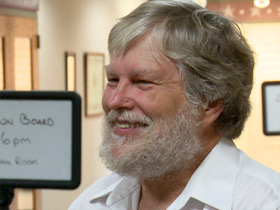
O'BRIEN: You were here in 2008 when this case first came up?
LYNCH: Right.
O'BRIEN: And then they invite you back now when it's before the U.S. Supreme Court?
LYNCH: Right.
O'BRIEN: Coincidence?
LYNCH: Maybe.
O'BRIEN: Do you think the litigation has anything to do with your appearance here?
LYNCH: Indirectly, it does. It was because I heard about the litigation, I checked with the town Clerk to see if they were still doing this, and they invited me back.
O'BRIEN: The lower court found that of more than a hundred thirty prayers offered, only four had been offered by non-Christians.
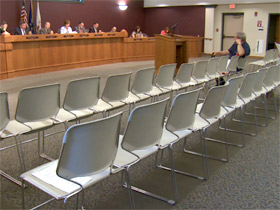
The impact of all this is unclear given that hardly anyone ever shows up at these Board meetings. The number of spectators rarely exceeds the number of Board members.
The most consistent spectator may be Susan Galloway, who for years has shown up with her video camera to document the proceedings.
Attorney Khan took the unusual step of including links to Galloway’s video in the electronic version of the brief she filed with the Court, allowing the Justices to instantly view what the lower court found to be an unconstitutional government endorsement of religion:
Voice on evidence tape: Father Alex Bradshaw from our Mother of Sorrows Church will say our prayer for this evening. Father Bradshaw...
O'BRIEN: Father Alex Bradshaw is typical:
Father Alex Bradshaw: We acknowledge the saving sacrifice of Jesus Christ on the cross. We draw strength, vitality and confidence from his Resurrection at Easter. Jesus Christ, who took away the sins of the world, destroyed our debt, through his dying and in his rising, he has restored our life. Blessed are you who has raised up the Lord Jesus...
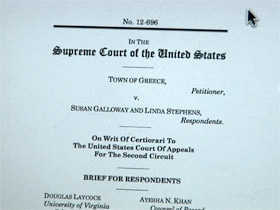
O'BRIEN: That the message is predominantly Christian should be of no concern, says Supervisor Auberger, because anyone can give the prayer and say whatever they please.
AUBERGER: If anyone at any time during my 15-and-a-half years as supervisor were to come and want to be able to offer the prayer, then we would have definitely obliged them.
O'BRIEN: You don't censor or control anything that they say?
AUBERGER: No, absolutely not.
O'BRIEN: What if somebody were to come in and say, "Believe in Jesus or you’re going to burn in hell forever?"
AUBERGER: Well, we believe in again diversity to be able to pray, to say the prayer in a manner that that individual decides.
O'BRIEN: So if they were to say that, you would not object?
AUBERGER: No, we could not object because our purpose is to allow prayer, to allow that diversity, and to allow a freedom of expression in their prayer.
O'BRIEN: The Obama Administration is siding with the Town of Greece in the case, telling the Court legislative prayer is permissible, even with religious content, so long as “it does not proselytize or advance any one, or disparage any other, faith or belief.”
The Administration relies heavily on a 1983 Supreme Court ruling allowing state legislatures to hire chaplains to offer invocations at the start of their legislative sessions. Both the U.S. Senate and the House routinely begin their sessions with prayer.
The attorney for the plaintiffs will not challenge that in the Supreme Court but will insist if there is to be prayer, it must be more neutral than what occurs in Greece.
KHAN: What we are saying is that when a religious message is presented to an audience, the government needs to be very careful to present only the most ceremonial and inclusive and ecumenical message.
O'BRIEN: Over the years, no single issue has divided the Justices more sharply than questions of church and state and this case is not likely to be any exception.
And as is often the case here, it may not be who wins or who loses that matters most, but rather what sort of compromise the Justices reach. Some form of legislative prayer is certain to be allowed, but how much religion is too much? Some endorsement of religion may be unavoidable. When does it become unacceptable? The Justices takes up the question next month with no decision likely before spring.
For Religion and Ethics NewsWeekly, I’m Tim O’Brien at the Supreme Court.







